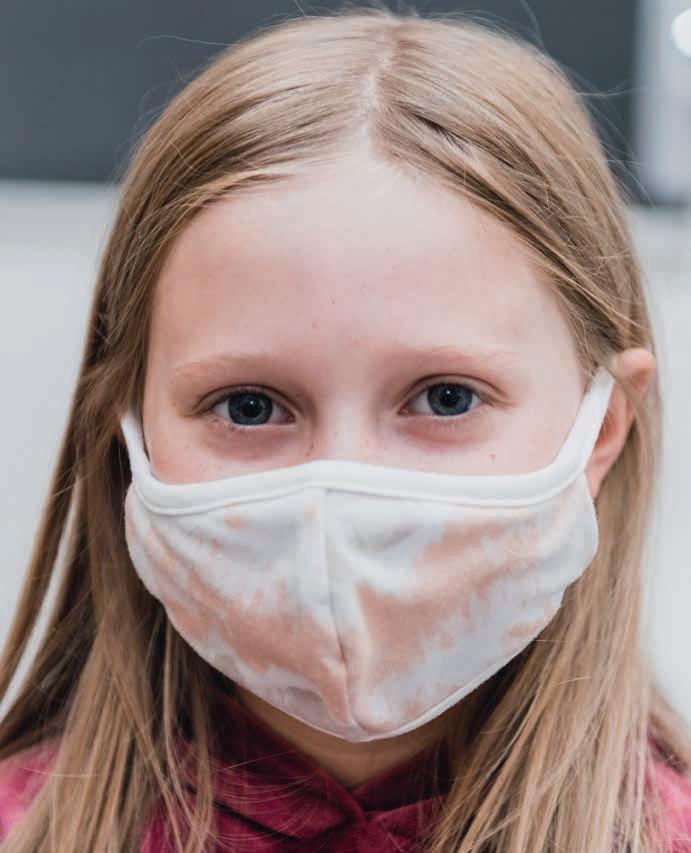OFFICE FOR COMMUNITY CHILD HEALTH Connecticut Children’s Office for Community Child Health (OCCH) is recognized as a pioneer in utilizing a cross-sector approach to build stronger systems to serve children, strengthen families and advance equity. OCCH guides its 15 community-oriented programs to promote the optimal health, development and well-being of children. Under the leadership of Paul H. Dworkin, MD, OCCH helps shape federal, state and local policy regarding child services; builds partnerships between internal and external programs across all sectors that influence child health and development; and cultivates innovations to support children and families that are the most at risk for adverse health and life outcomes. In 2020, children and families needed the services and supports provided by OCCH programs perhaps more than ever before. The global Covid-19 pandemic proved challenging, making it difficult for many to meet their basic needs and to endure stay-at-home orders in crowded and unhealthy environmental settings. OCCH pivoted its priorities to deliver an extraordinary level of care and support under these unprecedented circumstances. OCCH also embraced the challenge raised by the Black Lives Matter movement to address longstanding issues of racial and social injustice. In response to a call from Connecticut Children’s executive leadership to embed diversity, equity, and inclusion in all aspects of the organization, OCCH leadership formed a Pathways to Action work group to identify areas of opportunity in the workplace. The Pathways work group developed a strategic plan to guide OCCH’s efforts along with improvements to ensure OCCH workplace culture is welcoming and inclusive. In addition to these achievements, OCCH is excited to share the following updates from its programs during the past year: The Childhood Prosperity Lab advances innovative strategies that address the social, environmental, and 178
ANNUAL ACADEMIC REPORT 2020
behavioral drivers of health and help children reach their full potential. The Lab works with organizations in sectors known to impact the healthy development of children, including child welfare, early care and education, and nutrition. The Lab provides consultation, technical assistance, coaching, and other supports as organizations pursue their desired level of impact. During 2020, the Lab advanced five innovative strategies addressing different facets of child health, including integrating the developmental promotion, screening, referral, and linkage strategies of our nationally renowned Help Me Grow® program into WIC (the Special Supplemental Nutrition Program for Women, Infants, and Children) settings. The Lab also consulted with seven change-makers. The Children’s Center on Family Violence represents a collaboration between the Injury Prevention and Child Abuse programs at Connecticut Children’s and the Connecticut Coalition Against Domestic Violence (CCADV). This group works to reduce the impact of family violence on children and has three new initiatives born of the pandemic. The first involves deploying messages about domestic violence resources via Connecticut Children’s telephone hold messaging and developing content for virtual waiting rooms and the electronically generated after-visit summary. A second initiative under development focuses on enhancing CCADV advocacy for children entering shelters and motels, leveraging expertise at Connecticut Children’s to help CCADV advocates support these children in new ways. Finally, a third initiative involves piloting universal education about domestic violence and its impact on children in Connecticut Children’s child abuse outpatient clinic (and via telehealth visits). The adoption of our Co-Management program’s CLASP (Connecticut Children’s Leaders in Advanced Solutions in Pediatrics) referral guidelines significantly increased during 2020 by 77 percent, upping our verified clinical provider users to 426 across the region. Co-Management debuted an easier-to-navigate Internet experience, in which pediatric primary care providers can search for referral guidelines by specialties and conditions. Such guidelines help providers expand their scope of practice by screening, evaluating, and














































